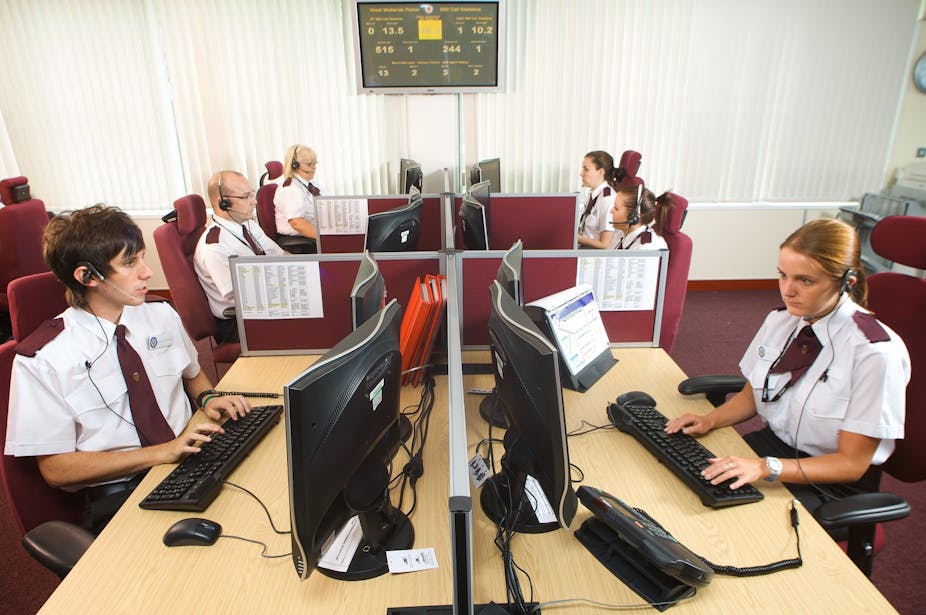On November 22, the national police non-emergency 101 and the NHS 111 services suffered disruption as a result of a technical fault in the Vodafone national network. This meant that people wishing to report a crime or discuss a medical problem could not get through to the main service they needed. What followed highlights issues with these non-emergency lines that haven’t been adequately addressed by the government.
Problems were first detected at around 9am and the service was fully restored in four hours. During these hours, some callers heard automated recordings providing alternative numbers, some calls were re-routed to national centres and others got an engaged tone. Police forces announced via social media and online alternative numbers to call and the news media reported the problems through their online, television and radio channels. Throughout this time the national 999 emergency service was unaffected. While only a handful people were affected by this outage, the problems are serious.
Public service in private hands
The absence of a national telecommunications provider means that all public telephone services are managed by commercial companies working to contracts issued by the UK government. In the case of the national 101 and 111 services, the contract for providing these was awarded to Cable & Wireless Worldwide, but following a buyout in 2012, now falls under the control of Vodafone.
People calling these national numbers are automatically routed to a local Police or NHS centre where their call is answered. Vodafone’s network is therefore responsible for determining where the call originated and ensuring that it is routed to the appropriate destination. According to Vodafone, a fault in their call routing system caused the problems on Saturday.
Today’s telephone networks are complex structures that in essence comprise several hundred computers linked together and controlled by sophisticated software. No technology is totally reliable and so additional infrastructure is deployed to offer backup routes when faults do occur. Clearly the nature of the problems encountered by Vodafone on Saturday overwhelmed even the backup systems resulting in a service outage and the inevitable disruption to the public.
While the 101 and 111 services are intended for non-emergencies, people still call these numbers in a state of heightened stress. Therefore, at a time when these people need the reassurance of talking to someone who can help them, the failure or disruption of the service has exactly the opposite effect.
Increasingly organisations and governments are relying on telephone or online systems as the prime, and sometimes only, means to deliver information and services to the general public. However, in so doing there is an underlying assumption on their part that you can always get through.
Adding backups
One way to offer improved reliability is to build redundant networks that can survive technology failures, electrical supply problems, extreme environmental impacts and any other problem that you can imagine. Building a network of that quality is hugely expensive and ultimately taxpayers will have to foot the bill. Alternatively, as is the case with the 999 service, multiple companies can be used to provide the service thereby removing the reliance on a single company and, hence, one network.
There is always an economic argument to be had which has to balance the importance of the service with how much investment can be justified to build the networks that support them. So for a non-emergency service, such as 101 and 111, a simpler option is to provide limited redundancy and recognise that some fault conditions will cause service outages. When those outages occur, alternatives are offered until the normal service can be restored which is exactly what happened on Saturday.
In the case of the 101 and 111 services, contracts to operate these services are awarded by the UK government and overseen by the regulator, Ofcom. Those contracts should include a Service Level Agreement that defines what, if any, service outage can be tolerated and what restoration procedures and times should be met. It is now a matter for Ofcom to decide if Vodafone met these conditions and if not, for action to be taken against them.
However, there is also an obligation on the part of the government to avoid providing misleading information. In the case of the 101 and 111 services which were introduced to reduce pressure on the 999 service, it is important that people know what to do in the case when these numbers don’t work. Current advice on using the 101 service for example explains what to do if the number is blocked but not what to do if it is faulty.
If we demand that our national public services, such as 101 and 111, need to become more reliable then the government either needs to increase pressure on the provider of the service to improve their network resilience or spread the risk by using multiple providers. Otherwise they need to better manage our expectations of the reliability we can expect from these services.

